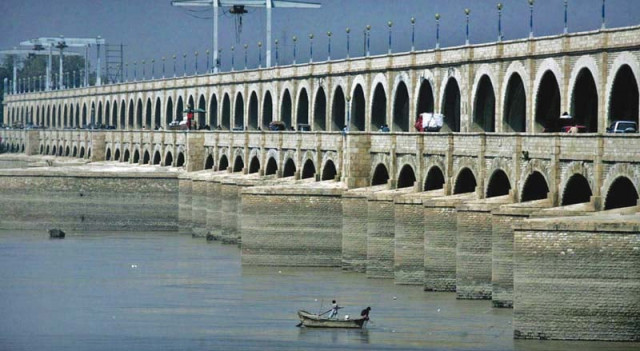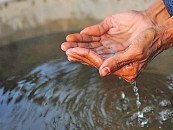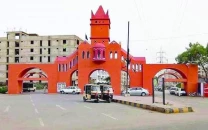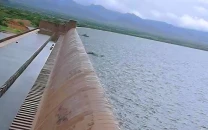Water woes: Experts to be hired to rehabilitate Sukkur Barrage
The construction of a new barrage is also being considered

Built during the reign of the British Raj, the Sukkur barrage is need of rehabilitation and modernisation. The World Bank's offer of financial and technical assistance could increase the barrage's lifespan by 20 to 25 years. PHOTO: FILE
Ruling out high floods in Sindh this year, Sindh Chief Minister Qaim Ali Shah has claimed that 400,000 cusecs to 500,000 cusecs of water is expected to pass through the barrages.
He was speaking after attending a briefing on the flood situation and the rehabilitation of Sukkur Barrage at the office of Sukkur Barrage's executive engineer on Sunday. The World Bank has offered a soft loan and the provision of expertise for the rehabilitation of the barrage, he said.

According to him, 80 per cent of Sindh's agriculture is dependent upon Sukkur Barrage and a team of foreign experts will arrive in Sukkur to discuss proposals about its rehabilitation and modernisation. He has said that the rehabilitation will continue if the experts say it will increase the barrage's lifespan by 20 to 25 years, otherwise the process of constructing an alternative barrage will begin.
Sindh irrigation secretary Zaheer Haider Shah informed that three consultant firms, one from the UK and two from Pakistan, have prepared feasibility reports but have not given an estimated cost. Shah said that in the next couple of days, medium floods carrying little more than 450,000 cusecs of water will pass through Guddu Barrage, while 385,000 cusecs is expected to pass through Sukkur Barrage. He said that previously floods of 1.2 million cusecs had passed through Sukkur Barrage and therefore there is nothing to worry about.
Earlier the CM, who was accompanied by the leader of the opposition in the National Assembly, Syed Khursheed Ahmed Shah, MPA Syed Nasir Hussain Shah and others, attended a briefing in a closed room. Informed sources told that a lack of interest was observed among the participants of the briefing about the rehabilitation work of Sukkur Barrage, rather they were more interested in constructing a new one. Khursheed Shah wanted to get expert advice for the construction of a new barrage from the retired Punjab irrigation secretary, Malik Ahmed Khan, and Mansoob Zaidi, who constructed Taunsa Barrage, informed sources.
In 2004, a huge pit developed in front of the second gate of Sukkur Barrage and experts repaired it by fixing sheet piles and changing blocks, since then it has worked properly. An irrigation expert speaking on the condition of anonymity said that, in 1983, gate 31 was damaged, after which a foreign company was called in to replace all the gates of the barrage and its canals between 1986 and 1991.
According to him, besides carrying out annual repairs and maintenance of the barrage, which includes oiling and greasing of the gates and checking its filter blocks and pavement for any damage, all the gates of the barrage and its canals should be painted after every five years. But no painting of the gates has been done since 1991, due to which the gates are gathering rust and turning weak, he said.
When the pit developed at gate two of Sukkur Barrage in 2004, irrigation experts from Punjab, including Malik Ahmed Khan, Mansoob Zaidi, visited the barrage and gave expert advice. He claimed that the structure of the Sukkur Barrage is intact and the only thing needed is to change all the blocks and paint the gates.
As of Monday, the water level in upstream Guddu Barrage was 353,361 cusecs and downstream was 3261,77 cusecs. At Sukkur Barrage, the upstream water level was 269,560 cusecs and downstream was 214,030 cusecs. The upstream water level at Kotri Barrage was 69,563 cusecs and downstream remained 28,868 cusecs.
Published in The Express Tribune, July 21st, 2015.



















COMMENTS
Comments are moderated and generally will be posted if they are on-topic and not abusive.
For more information, please see our Comments FAQ